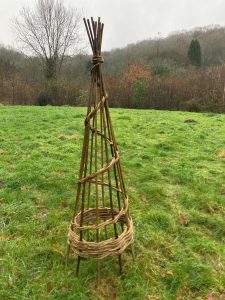Plant Supports – £45
About the workshop

After looking at a few examples of simple plant supports which could be made at home, participants will spend a morning making at least one or two.
If your flower borders are becoming an untidy tangle, whilst this may be perfect for wildlife, you may want to restore a little bit of order in places, before the summer gets fully underway! Or you might prefer to make yourself a sweet pea/runner bean wigwam.
A significant element of the session in the forest will simply be enjoying the peace and quiet of the beautiful surroundings. We hope that everyone will go home refreshed and revitalised, having spent time connecting with nature and learning a new skill.
Please Note
- This course is suitable for adult beginners.
- No level of experience or ability is required.
- This workshop is practical by nature, and participants will need to have a reasonable level of fitness and mobility to take part and enjoy the activities.
- This will take place either outside or in one our farmyard buildings. Participants must ensure they are appropriately dressed for the activity. WCLT reserves the right to prevent a participant from taking part in the activity if they are not wearing suitable clothes and footwear.
- If you book a place on a workshop, but are then no longer able to attend, you will not be entitled to a refund. If you would like to transfer your booking to another workshop, we shall make reasonable efforts (subject to availability) to rearrange the booking, but shall not provide any guarantee to this effect.
- WCLT reserves the right to cancel a workshop. This will only happen in exceptional circumstances. Those with pre-booked places will be offered a choice of alternative dates.
More Information
The Wyre Community Land Trust helps manage and conserve the wildlife and habitats of the Wyre Forest and provides opportunities for the local community to learn and engage with the natural environment and heritage crafts.
The Ruskin Club is inspired by John Ruskin (1819-1900), the Victorian artist and social critic, who’s vision for Ruskin Land was for it to be ‘beautiful, peaceful and fruitful’. Ruskin wanted everyone to see and enjoy the unspoiled, inspirational beautify of the world, both in nature and in art. He argued that work should be creative and so he influenced the revival of rural industries and handicrafts.